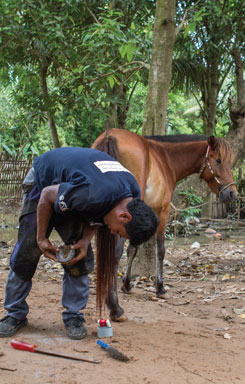On the map
About 600 million people worldwide depend on nearly 100 million equids for their livelihood, according to a 2018 report from Brooke, an international animal welfare organization that focuses on improving the lives of working horses, donkeys, and mules.
However, because of socioeconomic factors, 90 percent of the world's equid population receives only 1 percent of the world's veterinary care, said Anne Henderson, executive director at Equitarian Initiative, a nonprofit that provides veterinary services and education in developing nations.
"The animals who need health care the most, frankly, don't have access to it. Yet, they are responsible for agriculture, tourism, transportation, and trade and commerce," Henderson said.
Animal welfare organizations working in developing countries on this issue include World Horse Welfare, Brooke, Equitarian Initiative, Donkey Sanctuary, and the Society for the Protection of Animals Abroad. Leaders say their work, which impacts consumers everywhere, heavily relies on compassion and understanding.

Many people in the developed world look at the conditions under which these animals live and work and see cruelty. "It may be cruel, but it is not cruelty," said Dr. Derek C. Knottenbelt, professor emeritus at University of Liverpool and director of Equine Medical Solutions. "You cannot expect a mother or a father of five small children to say: 'I'll tell you what, I'll feed the donkey, but I won't feed the children.' It can't be done that way."
Spotlight
Shining a light on the role of working equids is one of the goals of World Horse Welfare, an international horse charity based in the U.K. The organization works with local partners in Mexico, Cuba, Haiti, Colombia, and Senegal, among other countries, to create community networks to improve the care and treatment of equids at a local level.
"Awareness of working equids is our ultimate aim. The more people that are aware of working equids ... it can only help to put them on the map in the first place and get them to be seen a bit more," said Dr. Emma Hales, international program officer at World Horse Welfare.

One way organizations work to create awareness is by educating the developed world on how much it—along with families and communities in developing countries—also relies on equids.
"These animals are hugely important to these families and communities but also to the world economy," Henderson said. "These animals are moving coffee, coconuts, tobacco, and spices. A lot of the products we use as consumers, in a lot of instances, start on the backs of a horse, mule, or donkey."
Care locally
The Equitarian Initiative works in about 10 to 12 countries each year; its programs vary depending on culture, need, and the partnerships it can create within a community.
"This is an animal welfare organization, but when you peel back the onion, this is about humanitarian aid. These people rely on these animals," Henderson said. "It's about improving the lives of the animals while also improving the lives of the people and ensuring they have the tools to maintain the health of these animals who are responsible for their economic livelihood."

Some working equids can be seen suffering from preventable issues such as dehydration, rabies, lameness, wounds from tack and saddles that are not properly fitted, and malnutrition, Henderson said.
World Horse Welfare is focused on making sustainable care solutions possible because owners can't necessarily afford services such as farriery, saddlery, or veterinary care.
"In Guatemala, our community-based equine providers are growing remedies for a natural dewormer. It is affordable and sustainable," said Jessica Stark, director of communications and public affairs for World Horse Welfare. "It is similar to wound care, where we show people how to use honey as an antiseptic."
The organization also tries to adapt its teaching methods to the location and uses local resources to make items such as collars, bridles, and horseshoes more affordable.
In Honduras, a U.K. saddler working with a regional trainer from El Salvador designed a harness system from local resources to make it sustainable and affordable, Dr. Hales said. "The harness collar was made out of coffee sacks and reinforced steel, padded out with a dry plant called tule, and then further padded using a blanket from the local market. The breeching and head collar were made from a combination of locally sourced webbing and old fire hose," she said.

In several countries, including Peru and Honduras, the Equitarian Initiative works with local veterinary colleges to offer students the chance to learn more about equids.
"A lot of times, folks in these veterinary colleges don't have a lot of access to equines. They are often taught small animal and livestock. Working equids don't necessarily make it into that equation (but that varies by region)," Henderson said.
In Peru, the Equitarian Initiative brought 10 students from a local veterinary college on a seven-day working trip to provide hands-on experience with working equids.
"It doesn't take money. What it takes is education, sympathy, understanding, and caring," Dr. Knottenbelt said.
Veterinarians can help equids worldwide by doing the following:
- Learn about the important role of equids in different cultures and in the world economy.
- Raise awareness about the role of equids by educating clients.
- Donate old, easy-to-move equipment to animal welfare organizations, rather than throwing it away.
- Donate your time by volunteering with an animal welfare organization to help with clinics, education efforts, or workshops
- Offer financial support such as providing donations or student scholarships to animal welfare organizations.
Related JAVMA content:
Caring for those that carry the load (Feb. 01, 2010)